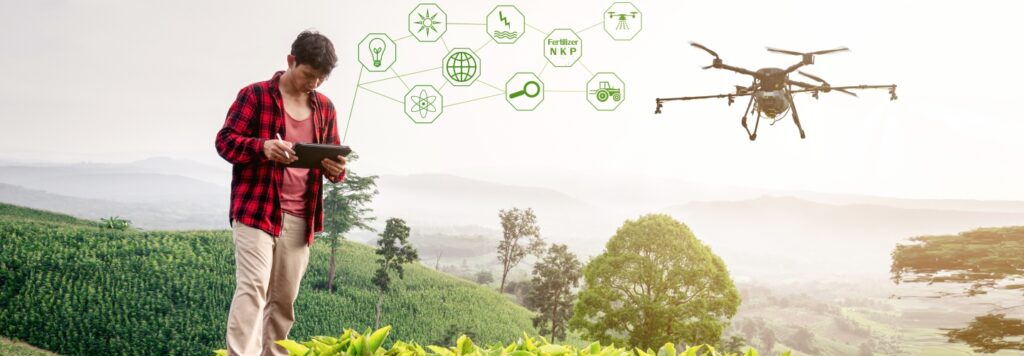IoT-driven Digital Agriculture – Changing the Face of Smart Farming

Implementation of the Internet of Things (IoT) is the newest buzzword in the agriculture industry. With the exploding world population and growing food safety concerns, it has become inevitable to upgrade farming with smart hardware devices. IoT-driven agriculture can effectively ease the burden on and optimize farm management.
Smart agricultural devices can help in acquiring pertinent farm data and provide actionable insights to the farmers. Read on to understand how IoT-driven agriculture can help in enhancing your farm management efforts, leading you to better agricultural outcomes.
Meeting the rapidly escalating food demands amid the rising extreme weather events is proving to be a herculean task for farmers. Growing incidents of pest infestations and crop diseases are causing huge losses. Labour shortages and livestock illnesses are further taking a toll on farm management practices. These factors are affecting the livelihoods of vulnerable farmers and threatening the nutrition security of millions.
The influence of smart devices has been invariably positive since its commencement. IoT-driven agriculture is significantly boosting farm management efforts and enhancing the quality of crop yields. The use of smart sensors, agribots, drones, and other devices can encourage the adoption of precision farming and enable data-driven decision-making. This can alleviate farmers’ heavy workloads and ensure high-quality crop outputs with optimized farm management.
Agricultural Sensors for Precision Farming Strategies
Climatic conditions have a major influence on the quality and productivity of crop yields. In the absence of accurate weather prediction, crops can be severely damaged by destructive rains, floods, or acute temperatures and winds. This can result in huge losses for the farmers with a deteriorated farm management system. Having a weather station is thus becoming increasingly important to practice precision farming with IoT-driven agriculture.
Monitoring weather conditions is one of the most important applications of hardware devices in agriculture. Smart farming sensors can provide farmers with critical data related to humidity, temperature, moisture precipitation, and dew detection. This can further help the farmers in determining weather patterns to make the right crop cultivation decisions.
By encouraging IoT-driven agriculture, FarmERP can bring precision into sowing, irrigation scheduling, fertilizer spraying, and harvesting operations. FarmERP’s farm management system can also help farmers in carrying out climate-resilient farm production to protect the farms against extreme weather events. This way, with efficient sensors and on-farm weather stations, FarmERP can help in making the farm activities more efficient and accurate.
Agribots are Addressing the Labour Shortage Challenge
One of the major issues faced by farmers, especially in the current times, is the lack of skilled workers. Consequently, farmers end up spending more time on tedious activities and can hardly focus on their business. An inadequate workforce also stunts agribusiness growth with poor weed control measures and improper seeding activities.
As automated technologies penetrate the farming industry with IoT-driven agriculture, agribots are gaining more and more traction. By performing tasks ranging from planting and watering to harvesting and sorting, agribots can aid the production of higher quality crops. Agribots can also help farmers in optimizing data collection and analysis to enhance their farm planning strategies.
By enabling integration with agricultural robots, FarmERP can assist farmers to accurately detect crop weeds and diseases. This can prove to be extremely helpful for farmers suffering due to the unavailability of the workforce. This way, by effectively countering labour shortage challenges, FarmERP is ensuring improved farm functions and better crop productivity for farmers.
Smart IoT Wearables: Ensure Maximum Livestock Livelihood
By supplementing family incomes, livestock occupies a unique and significant position in the socio-economic development of farmers. Every year, farmers across the world incur tremendous losses due to animal illnesses that lead to death. Without IoT-driven agriculture, livestock monitoring can be ineffective and animal injuries or illnesses in a herd can go totally undetected.
These factors have made it indispensable for farmers to keep track of the health and location of their livestock. IoT-driven agriculture enables smart livestock management solutions to ensure the well-being of farm animals. These solutions employ smart wearables that help in monitoring blood pressure, heart rate, temperature, respiration rate, and other vital factors.s
FarmERP’s farm management system can help farmers to check in on the health and location of their livestock from anywhere in real-time. Farmers can also detect sick animals well in time and separate them from the herd to prevent the spread of diseases. By providing rich insights with IoT-driven agriculture, FarmERP can thus help you in ensuring maximum livestock livelihood and efficiency.
Agricultural Drones: Improved Decision-making with Accurate Data
Farmers today are faced with a barrage of on-field challenges that adversely affect their farm management efforts. Ensuring optimal resource allocation, assessing soil quality, and detecting pests are turning out to be quite time-consuming for the farmers. These hindrances are depriving farmers of potential growth and development opportunities.
With tremendous benefits of IoT-driven agriculture, farmers are turning to agricultural drones to counter all challenges with fast, efficient solutions. Drones can provide farmers with a wealth of data that help in getting a more accurate map of farm conditions. Equipped with sensors and cameras, drones are highly effective in imaging, mapping, and surveying the farms.
By enabling integration with smart drones, FarmERP has been encouraging farmers to adapt to specific environments and make smart farming decisions. It can also assist farmers in employing the right measures to maintain optimal crop health. Thus, with solutions based on reliable data, FarmERP helps in practicing smart farming to significantly enhance crop productivity.
IoT-driven agriculture can bolster farm management efforts and encourage farmers to produce high-quality crops. FarmERP’s expertise can provide farmers with excellent support to carry out efficient farming operations. Contact us to know how our farm management system can help you leverage the benefits of smart agricultural devices.
